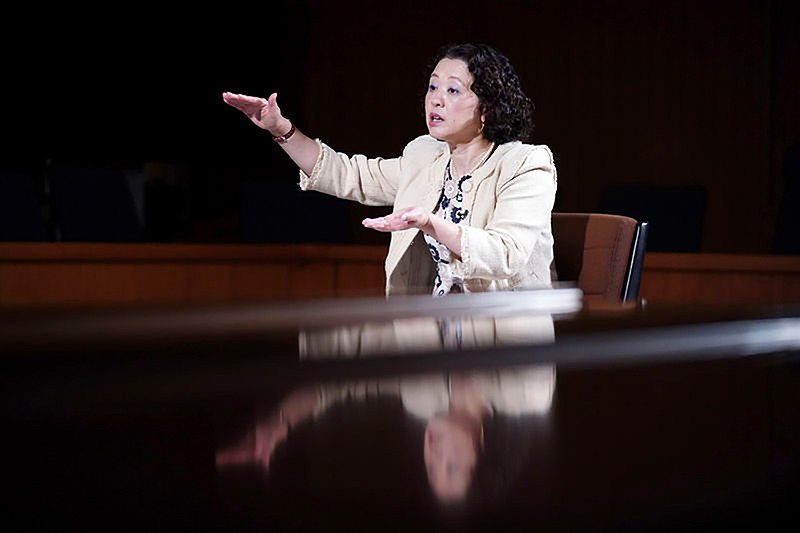
Tomoko Yoshino, the first woman to lead Rengo, Japan’s biggest labor organization, speaks during an exclusive interview with the Associated Press on Thursday in Tokyo.
November 4, 2021
TOKYO (AP) — The head of Japan’s largest labor federation says she is determined to listen to the voices of all workers in fighting for better wages and conditions.
Tomoko Yoshino is the first woman to head Rengo, the Japanese Trade Union Confederation.
In an interview Thursday with The Associated Press, she said stable work has to be the top priority after the pandemic, which hit women and other vulnerable groups the hardest.
Japanese unions traditionally have mostly just represented “regular workers,” or people employed in full-time permanent jobs. Rengo has stepped up efforts to encourage labor organizing among “non-regular” workers, such as those on temporary contracts, part-timers and freelancers, a large share of whom are women.
“The most urgent issue is to secure stable employment. Suicides have risen among women … and many ‘non-regular’ workers fear losing their jobs, while many others were laid off and ended up in dire straits after using up their savings,” said Yoshino, who last month was elected president of the federation of about 7 million workers.
The poverty rate among Japanese children, especially in single-parent households, is one of the highest among wealthy nations, she noted.
“In order to stabilize their daily life, we must hurry to protect their employment,” she said. “In that sense, as head of Rengo, I believe I must extend a hand to those people and listen to their voices closely and demand a better working environment for them.”
The number of suicides in Japan rose by 912 to 21,081 last year, the first year-on-year increase since 2009, according to an annual report released Tuesday by the Ministry of Health, Labor and Welfare.
It attributed the increase to the pandemic. While the number of suicides among men fell for the 11th straight year, those among women rose 15% to 7,026, the first increase in two years.
Rengo’s main responsibility is to negotiate with the employers of its members, especially in “shunto” annual wage talks. But Yoshino also is a member of a government panel appointed by Prime Minister Fumio Kishida to discuss ways to counter rising inequality with what he calls “new capitalism.”
In that role, she said, “we are talking about all workers, including those outside of Rengo, so I would like to firmly speak up on behalf of the non-regular workers toward improving labor conditions, to protect human rights and correct disparities.”
On paper, Japanese women enjoy the same rights as men at work. In reality, those laws are not enforced. Women’s pay, benefits and opportunities for promotion lag far behind men’s.
Gender inequality is also woven into the country’s tax and pension system, but it’s just part of a wider problem with workers’ rights, she said.
“We must seek equality of opportunity,” she said. “Companies have accountability for the treatment of each of their employees.”
Top Articles in Business
-

Prudential Life Insurance Plans to Fully Compensate for Damages Caused by Fraudulent Actions Without Waiting for Third-Party Committee Review
-

Narita Airport, Startup in Japan Demonstrate Machine to Compress Clothes for Tourists to Prevent People from Abandoning Suitcases
-

Japan, U.S. Name 3 Inaugural Investment Projects; Reached Agreement After Considerable Difficulty
-

Toyota Motor Group Firm to Sell Clean Energy Greenhouses for Strawberries
-

SoftBank Launches AI Service for Call Centers That Converts Harsh Customer Voices into Softer Voices
JN ACCESS RANKING
-

Japan PM Takaichi’s Cabinet Resigns en Masse
-

Japan Institute to Use Domestic Commercial Optical Lattice Clock to Set Japan Standard Time
-

Israeli Ambassador to Japan Speaks about Japan’s Role in the Reconstruction of Gaza
-

Man Infected with Measles Reportedly Dined at Restaurant in Tokyo Station
-

Videos Plagiarized, Reposted with False Subtitles Claiming ‘Ryukyu Belongs to China’; Anti-China False Information Also Posted in Japan






















